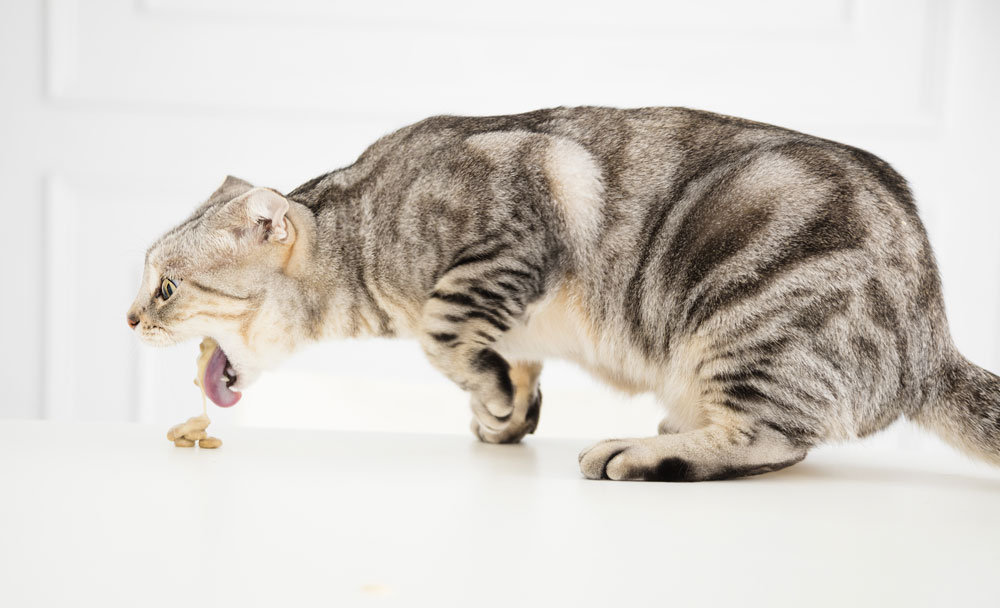For many cat owners, frequent vomiting in their pets is both a common and concerning issue. It’s crucial to understand that while occasional vomiting may not indicate a serious problem, frequent incidents can be a sign of dietary intolerance, sensitivity, or health issues. Choosing the right cat food is essential in reducing these episodes and improving the overall well-being of your feline friend.
Understanding Why Cats Throw Up
- Common Causes of Vomiting in Cats: Cats may throw up for various reasons, including hairballs, dietary intolerance or allergies, eating too quickly, or stress. Certain medical conditions like gastrointestinal disorders can also lead to vomiting.
- When to See a Vet: If your cat is vomiting frequently or showing other symptoms like lethargy, diarrhea, or weight loss, it’s important to consult a veterinarian to rule out serious health issues.
Key Features of Cat Food for Sensitive Stomachs
- Easily Digestible Ingredients: Foods with simple, highly digestible ingredients can be gentler on a cat’s stomach. Look for foods with quality protein sources such as chicken, turkey, or fish, and limited filler ingredients.
- Grain-Free and Novel Protein Options: Some cats may be sensitive to common proteins or grains. Trying a grain-free diet or a novel protein source (like duck, venison, or rabbit) can sometimes alleviate vomiting.
- Added Fiber for Hairball Control: For cats prone to hairballs, a diet with increased fiber can help. Fiber aids in the smooth passage of hair through the digestive system.
Top Cat Food Brands for Cats That Throw Up
- Hill’s Science Diet Adult Sensitive Stomach & Skin Dry Cat Food: Formulated for easy digestion and to nourish skin.
- Pros: Prebiotic fiber for gut health, made with high-quality ingredients.
- Cons: Contains grains, which may not suit all cats.
- Price: Around $26 for a 7-lb bag.
- Availability: Widely available in pet stores and online.
- Blue Buffalo Sensitive Stomach Natural Adult Dry Cat Food: A natural diet formulated for cats with sensitive stomachs.
- Pros: Real chicken as the first ingredient, contains FOS prebiotics.
- Cons: Some cats may not find the flavor appealing.
- Price: Approximately $35 for a 15-lb bag.
- Availability: Most pet stores and online.
- Royal Canin Digestive Care Dry Cat Food: Specifically designed for cats with sensitive stomachs.
- Pros: Ring-shaped kibble encourages slower eating, highly digestible proteins.
- Cons: Higher price point, contains corn.
- Price: About $30 for a 6-lb bag.
- Availability: Pet stores and online.
- Purina ONE Sensitive Systems Adult Dry Cat Food: A diet that supports sensitive stomachs.
- Pros: Real turkey is the first ingredient, easy to digest.
- Cons: Includes corn and wheat.
- Price: Around $24 for a 16-lb bag.
- Availability: Supermarkets, pet stores, and online.
- Iams Proactive Health Sensitive Stomach Adult Cat Food: Made for adult cats with digestive issues.
- Pros: Contains prebiotics and beet pulp for healthy digestion.
- Cons: May not be suitable for all food sensitivities.
- Price: Approximately $20 for a 7-lb bag.
- Availability: Easily found in most pet stores and online.
Feeding Strategies for Cats Prone to Vomiting
- Small, Frequent Meals: Feeding smaller portions more frequently can help prevent vomiting by not overwhelming the digestive system.
- Slow Feeding Solutions: Using slow feeder bowls or puzzle feeders can help cats that eat too quickly, reducing the chances of vomiting.
Additional Dietary Considerations
- Probiotics and Digestive Enzymes: Supplements like probiotics can aid in maintaining a healthy gut flora, potentially reducing vomiting caused by digestive upset.
- Hydration: Adequate water intake is essential. Wet food can be beneficial for increasing hydration, which can aid digestion and reduce vomiting.
FAQs About Cat Food for Cats That Throw Up
- How can I tell if a new diet is helping my cat? Look for a reduction in the frequency of vomiting episodes and an improvement in overall behavior and appetite.
- Are there any specific ingredients I should avoid? It can vary depending on the cat, but common irritants include artificial additives, some grains, and certain protein sources.
- How quickly should I transition my cat to a new food? A gradual transition over 7-10 days is recommended to allow the cat’s digestive system to adjust.
- Can wet food help reduce vomiting? Yes, wet food is often easier to digest and can be beneficial for cats prone to vomiting.
- Should I be worried if my cat vomits occasionally? Occasional vomiting might not be a concern, but if it’s frequent or accompanied by other symptoms, it’s best to consult a vet.
Conclusion
Selecting the right cat food is vital for cats that frequently throw up. A diet tailored to their digestive needs can make a significant difference in reducing vomiting incidents and improving their overall health. Regular veterinary check-ups and careful monitoring of your cat’s diet are key to managing this issue effectively.

Jane Doe, a veterinarian with over 10 years of experience, combines her deep knowledge of animal health with a passion for pet welfare at PetsPonder.com. With a DVM degree and a commitment to the latest in veterinary science, Jane Doe offers reliable, compassionate advice to help pet owners make informed decisions for their furry companions.

Leave a Reply